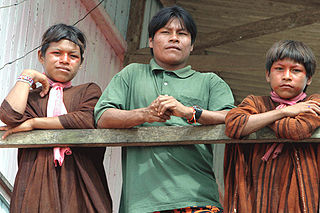
Arawan is a family of languages spoken in western Brazil and Peru (Ucayali).

The Asháninka or Asháninca are an indigenous people living in the rainforests of Peru and in the State of Acre, Brazil. Their ancestral lands are in the forests of Junín, Pasco, Huánuco and part of Ucayali in Peru.

Panoan is a family of languages spoken in Peru, western Brazil, and Bolivia. It is possibly a branch of a larger Pano–Tacanan family.
Kulina is an Arawan language of Brazil and Peru spoken by about 4,000 Kulina people. With such few speakers, Kulina is considered a threatened language. Kulina is similar to the Deni language, as they have even been considered different dialects of the same language. Both languages have SOV word order, as well as three sets of alveolar affricate consonants. It is believed the presence of the reconstructed phoneme *s in place of the fricative *sh is indicative of the Kulina and Deni languages as opposed to other languages in the Arawan family.
The Amahuaca or Amhuaca are indigenous peoples of the southeastern Amazon Basin in Peru and Brazil. Isolated until the 18th century, they are currently under threat from ecological devastation, disease and violence brought by oil extractors and illegal loggers. In 1998 they numbered about 520. The largest community of the Amahuaca is in Puerto Varadero, a jungle community on the Peruvian–Brazilian border.

The Indigenous peoples of Peru, or Native Peruvians, comprise a large number of ethnic groups who inhabit territory in present-day Peru. Indigenous cultures developed here for thousands of years before the arrival of the Spanish in 1532.
Vale do Javari is one of the largest indigenous territories in Brazil, encompassing 85,444.82 km 2 – an area larger than Austria. It is named after the Javari River, the most important river of the region, which since 1851 forms the border with Peru. It includes much of the Atalaia do Norte municipality as well as adjacent territories in the western section of Amazonas state. Besides the Javari it is transected by the Pardo, Quixito, Itaquai and Ituí rivers.

The Harakmbut are indigenous people in Peru. They speak the Harakmbut language. An estimated 2,000 Harakmbut people live in the Madre de Dios Region near the Brazilian border in the Peruvian Amazon.
Kulino or Kulina Pano is an obsolescent Panoan language of Javari River valley, Brazil. The Kulina Pano people live in the village of Aldeia Pedro Lopes on the middle stretch of the Curuçá River in Amazonas. There are very few native speakers of Kulina Pano language remaining, and it is no longer in daily use. All Kulina Pano speak Portuguese.
Madiha is an Arabic female given name.

The Huni Kuin are an indigenous people of Brazil and Peru. Their villages are located along the Purus and Curanja Rivers in Peru and the Tarauacá, Jordão, Breu, Muru, Envira, Humaitã, and Purus Rivers in Brazil.

The Ticuna are an indigenous people of Brazil (36,000), Colombia (6,000), and Peru (7,000). They are the most numerous tribe in the Brazilian Amazon.
The Machinere are an indigenous people of Brazil, Bolivia, and Peru. They live along the Acre River in Bolivia. In Brazil they mostly live in the Mamoadate Indigenous Territory, although some live in the Chico Mendes Extractivist Reserve, both in Acre.

The Charter of Ban Kulin was a trade agreement between the Banate of Bosnia and the Republic of Ragusa that effectively regulated Ragusan trade rights in Bosnia, written on 29 August 1189. It is one of the oldest written state documents in the region.
Culina or Kulina may refer to:
Olivença Kulina is a Panoan language of Brazil.







